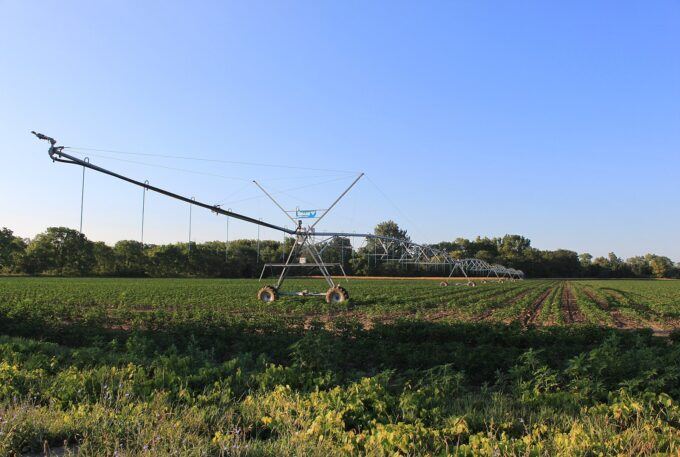American Soybean Farmers Sold Out; Argentine Counterparts Bailed Out

Photograph Source: Dwight Burdette – CC BY 3.0
Trade policy isn’t sexy, but it is weighty, economically speaking. Jobs and wage-income are at-stake. Take President Trump’s trade policy, notably his fondness for tariffs, a tax on U.S. imports that businesses and workers pay.
We begin with the Trump administration’s decision to provide a $20 billion “swap line” (currency exchanges between central banks) with the government of Argentina. Treasury Secretary Scott Bessemer is the point man for the White House on this financial and political issue.
The Latin American country is in financial distress over its issuance of foreign bonds since President Javier Milei slashed public spending to spur economic growth. Such economic policy goes by the name of austerity.
However, Milei’s so-called pro-growth approach has had the opposite effect. Hunger and poverty among the Argentine working class are up. Workers’ household income is down.
“Argentina’s poverty rate has soared to almost 53% in the first six months of Javier Milei’s presidency,” reports the Guardian, “offering the first hard evidence of how the far-right libertarian’s tough austerity measures are hitting the population.”
What in part preceded such measures slamming the Argentine people was inflation, a general rise in prices.
In the meantime, the Milei government cut the export tax on soybeans. Chinese buyers jumped at this opportunity, reportedly purchasing some 20 shiploads of soybeans from Argentina.
That tax holiday cut revenue to the Argentine government, and created the trade conditions for lower export prices for foreign buyers. That arrangement didn’t fix the tax revenue problem for the Argentine government, however.
Meanwhile, American Soybean Association President Caleb Ragland shared this statement on some impacts of Trump’s trade policy of tit-for-tat tariffs between the world’s two biggest economies.
U.S. soybean farmers have been clear for months: the administration needs to secure a trade deal with China. China is the world’s largest soybean customer and typically our top export market. The U.S. has made zero sales to China in this new crop marketing year due to 20% retaliatory tariffs imposed by China in response to U.S. tariffs. This has allowed other exporters, Brazil and now Argentina, to capture our market at the direct expense of U.S. farmers.
According to Politico, the use of tariffs in China-U.S. trade is having far-reaching effects on American agriculture generally. “The 20 percent retaliatory tariff that Beijing has imposed on U.S. imports hasn’t just pounded soybean producers. All agriculture exports to China were down 53 percent in the first seven months of 2025, compared with the same period last year, according to USDA data.”
Ragland, head of the ASA, continues his criticism of Trump’s trade policy on American soybean farmers. “The frustration is overwhelming. U.S. soybean prices are falling, harvest is underway, and farmers read headlines not about securing a trade agreement with China, but that the U.S. government is extending $20 billion in economic support to Argentina while that country drops its soybean export taxes to sell 20 shiploads of Argentine soybeans to China in just two days.
“ASA is calling on President Trump and his negotiating team to prioritize securing an immediate deal on soybeans with China. The farm economy is suffering while our competitors supplant the United States in the biggest soybean import market in the world.”
What will the White House do to relieve the pain from the decline of demand from China for American agricultural products? Well, the president is considering a $10-$15 billion bailout for agriculture commodity producers.
Wait. There is a federal government shutdown. In other words, the allocation and distribution of a federal bailout for farmers experiencing a shortage of buyers from China will have to wait for the government shutdown to end. Your guess is as good as mine when that happens.
Such contradictions of economics and politics drive history, according to Marx. The federal government shutdown over health care spending while U.S. Border Patrol agents and National Guard troops deploy on the streets of American cities for reason of so-called public safety are two cases in point. Trade policy that harms domestic agriculture generally and soybean growers particularly is another.
The post American Soybean Farmers Sold Out; Argentine Counterparts Bailed Out appeared first on CounterPunch.org.
Popular Products
-
 Adjustable Plug-in LED Night Light
Adjustable Plug-in LED Night Light$89.98$30.78 -
 Indoor Mini Practice Putting Golf Mat...
Indoor Mini Practice Putting Golf Mat...$80.45$42.78 -
 Portable Alloy Stringing Clamp for Ra...
Portable Alloy Stringing Clamp for Ra...$64.99$44.78 -
 Electronic String Tension Calibrator ...
Electronic String Tension Calibrator ...$30.99$20.78 -
 Pickleball Paddle Case Hard Shell Rac...
Pickleball Paddle Case Hard Shell Rac...$20.99$13.78